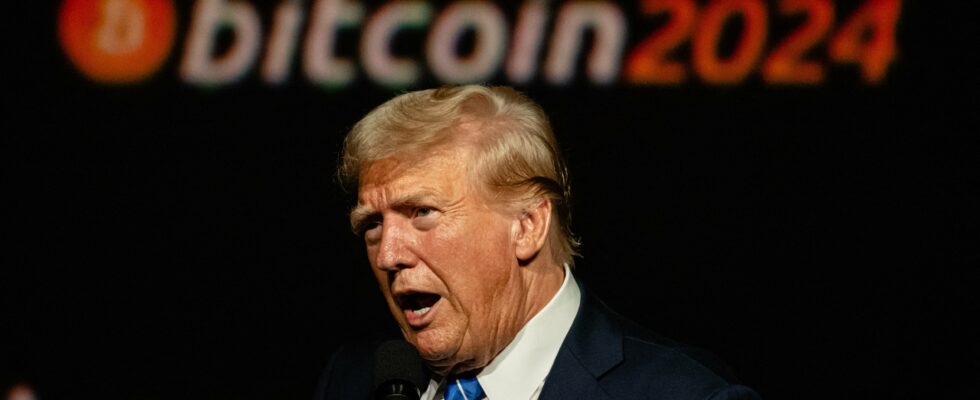When Donald Trump took the stage at the Bitcoin Conference in Nashville in late July, he was greeted like a rock star by the cheers of the attendees. Taking the microphone after the song was over God Bless the USAthe former president greets “bitcoiners”, congratulating himself on being the “first president in the world to attend an event dedicated to bitcoin”. Praising the “technological miracle that is bitcoin” or the “genius” of the industry representatives, Donald Trump also expresses his wish to make the United States the “world capital of cryptos”, to create a “strategic reserve of bitcoins”, or to choose “personalities who love [cette] industry” to establish a legislative framework. Each time, the crowd roars with joy.
The Republican candidate has not always been kind to the sector. In 2019, he tweeted that he was not “a fan of bitcoin or other cryptocurrencies,” whose value he considered “very volatile and based on hot air.” He also criticized the lack of regulation in the industry, accusing it of “facilitating illicit behavior, including drug trafficking and other illegal activities.”
In just a few years, Donald Trump has made a complete turnaround. In December 2022, he launched a collection of NFTs in his image, which sold out in just a few hours for $4.5 million. In May of this year, the candidate also became the first to accept cryptocurrency donations for his campaign, raising $3 million, the Wall Street Journal.
The new cryptocurrency lobbies
This strong interest in cryptocurrency is not due to chance: the bitcoin market has exceeded a trillion dollars. Above all, the industry has transformed itself in a few years into a real lobby, impossible to ignore in Washington. “What is striking with this campaign is the sums of money raised by the community, explains Nastasia Hadjadji, author of the book No Crypto. How Bitcoin Bewitched the Planet. Coinbase and many companies have donated to Super Pacs [NDLR : comités d’action politique, organismes chargés de lever de l’argent pour des candidats] like Fairshake, and if you look at the numbers, the crypto industry has given more money than big capitalist players, like oil companies.”
In total, $183 million has been raised by the cryptocurrency industry in the run-up to the election, according to figures from Follow The Cryptoa site developed by researcher Molly White. The gas and oil industry is said to have given “only” 8 million, according to OpenSecretan American NGO tracking lobby spending in politics.
Unlike the oil industry, which has given overwhelmingly to Republican candidates, the crypto industry’s PACS “have participated in a cross-partisan manner” in campaigns, Hadjadji said. So far, $16.4 million has gone to Republican candidates, compared to $13.9 million for Democratic contenders.
Because the sector is also trying to seduce the Democratic camp. Certainly, Joe Biden has shown throughout his mandate a frank opposition to cryptocurrencies, by vetoing it in particular to a bill that would have allowed banks and financial institutions to hold cryptocurrencies. But Kamala Harris is seen as more open on the subject. The candidate has not openly taken a position in favor of cryptocurrencies, but her positive image comes in part from the fact that she worked with many representatives of Silicon Valley when she was attorney general of California. She is also increasingly courted by the bigwigs of the sector.
“The lobbyists’ hope is that Biden’s hard line on cryptocurrencies will be changed, and that’s why they’ve given a lot, both to Democrats and Republicans,” says Nastasia Hadjadji. In the longer term, the industry would especially like a clear legislative framework to be established, similar to what was done in the European Union with the Mica regulation, says Faustine Fleuret, president of Adan, the association bringing together Web3 players in France. “In the United States, there are no specific rules, and that’s a brake on the development of companies, because the SEC [NDLR : l’organisme américain de contrôle des marchés] can say, overnight, that they now have to follow new rules,” explains the expert. Adan also notes that more and more American companies have been coming to set up in Europe over the past year and a half in order to benefit from a clear framework.
“There is an awareness in financial circles of the importance of cryptocurrencies for the United States,” observes Marie-Christine Bozom, political scientist and journalist specializing in the United States. That Beijing prohibits their use in 2021 would have pushed Donald Trump to take a greater interest in it. “He has an interest in countering China, including on financial issues, and his position on cryptocurrencies reflects that.”
A wild card to swing the swing states?
Outside of the world of economics, Donald Trump and Kamala Harris also have an interest in positioning themselves on cryptocurrency for cultural reasons. Digital assets are now a part of the lives of more and more Americans: according to a study According to a May 2024 report from the country’s central bank, 7% of adults said they held cryptocurrencies.
“It’s not a predominant topic, but it’s an important one: an American election is not won only by seeking the votes of Democrats or Republicans. It is also won with independents and undecided voters,” confides Marie-Christine Bonzom. Cryptocurrencies can help candidates seek additional votes. This is also what a OMFIF articlea think tank linked to the American banking sector. The organization believes that Kamala Harris cannot “afford to leave crypto to Trump” and urges the candidate to “adopt a conciliatory approach to the cryptocurrency industry”. According to it, there would be “little to lose, but potentially much to gain” for Democrats. This is especially true in the swing statesthese states which navigate between the Republican and Democratic camps between two elections, where the result is sometimes decided by a few thousand votes.
.
